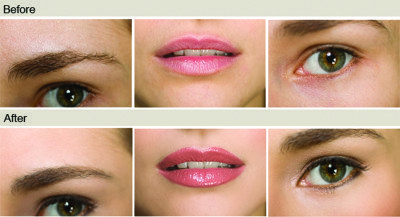 The idea of having something done to skin permanently does not sound appealing, considering the typical individual wants to change their appearance on a regular basis. Sometimes, it is a necessity.
The idea of having something done to skin permanently does not sound appealing, considering the typical individual wants to change their appearance on a regular basis. Sometimes, it is a necessity.
Permanent makeup is a cosmetic technique which permanently pigments the skin. The permanent makeup is done to forgo applying regular makeup on a daily basis, but it is also done for a variety of other reasons. In many cases, the technique is used to produce artificial eyebrows, fill in hairlines to show a fuller head of hair or to disguise scars.
Permanent cosmetic, also referred to dermapigmentation, micropigmentation and cosmetic tattooing, is helpful in cases where diseases such as alopeica totalis, cancer or old age occur. An individual has no eyebrows because of the disease or the cure and to improve self-esteem and presentation, permanent cosmetics are applied in order to create eyebrows. In the case of breast cancer reconstruction, patients undergo cosmetic tattooing for areola repigmentation after surgery.
Those who suffer from poor fine motor skills such as those suffering from arthritis, Parkinson’s disease or Muscular Dystrophy, who can not easily hold and apply makeup, are perfect candidates to have permanent makeup. Permanent cosmetics can also masks imperfections, camouflage scars or asymmetrical facial features.
Allergy sufferers also benefit from having permanent makeup. With itchy, watery eyes, makeup doesn’t come off if you rub your eyes with permanent eyeliner and eye make-up.
The art of permanent makeup began in the 20th century. Even though the tattoo is permanent, the work can fade over time and might need to be redone. Exposure to the sun or other environmental factors fades color and the amount and color of pigment deposit on the skin can affect the length of time that permanent makeup looks its best.
The colorant additives that are used in the cosmetic tattooing industry are regulated under the Federal Food, Drug, and Cosmetic Act. However, the industry is not rigorously monitored. The State of New York does not license permanent cosmeticians but a permit is required from the New York State Department of Health. The permit requires that the establishment use only single use needles and approved ink handling methods in all permanent cosmetic procedures.


















